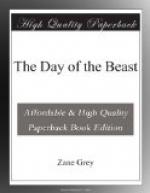Lane made not one passionate protest at the injustice of his fate. Labor, agony, war had taught him wisdom and vision. He began to realize that no greater change could there be than this of his mind, his soul. But in the darkness there an irresistible grief assailed him. He wept as never before in all his life. And he tasted the bitter salt of his own tears. He wept for his mother, aged and bowed by trouble, bewildered, ready to give up the struggle—his little sister now forced into erotic girlhood, blind, wilful, bold, on the wrong path, doomed beyond his power or any earthly power—the men he had met, warped by the war, materialistic, lost in the maze of self-preservation and self-aggrandizement, dead to chivalry and the honor of women—Mel Iden, strangest and saddest of mysteries—a girl who had been noble, aloof, proud, with a heart of golden fire, now disgraced, ruined, the mother of a war-baby, and yet, strangest of all, not vile, not bad, not lost, but groping like he was down those vast and naked shores of life. He wept for the hard-faced Mrs. Wrapp, whose ideal had been wealth and who had found prosperity bitter ashes at her lips, yet who preserved in this modern maelstrom some sense of its falseness, its baseness. He wept for Helen, playmate of the years never to return, sweetheart of his youth, betrayer of his manhood, the young woman of the present, blase, unsexed, seeking, provocative, all perhaps, as she had said, that men had made her—a travesty on splendid girlhood. He wept for her friends, embodying in them all of their class—for little Bessy Bell, with her exquisite golden beauty, her wonderful smile that was a light of joy—a child of fifteen with character and mind, not yet sullied, not yet wholly victim to the unstable spirit of the day.
And traveling in this army that seemed to march before Lane’s eyes were the slackers, like Mackay and Swann, representative of that horde of cowards who in one way or another had avoided the service—the young men who put comfort, ease, safety, pleasure before all else—who had no ideal of womanhood—who could not have protected women—who would not fight to save women from the apish Huns—who remained behind to fall in the wreck of the war’s degeneration, and to dance, to drink, to smoke, to ride the women to their debasement.
And for the first and the last time Lane wept for himself, pitifully as a child lost and helpless, as a strong man facing irreparable loss, as a boy who had dreamed beautiful dreams, who had loved and given and trusted, who had suffered insupportable agonies of body and soul, who had fought like a lion for what he represented to himself, who had killed and killed—and whose reward was change, indifference, betrayal and death.
That dark hour passed. Lane lay spent in the blackness of his room. His heart had broken. But his spirit was as unquenchable as the fire of the sun. If he had a year, a month, a week, a day longer to live he could never live it untrue to himself. Life had marked him to be a sufferer, a victim. But nothing could kill his soul. And his soul was his faith—something he understood as faith in God or nature or life—in the reason for his being—in his vision of the future.




